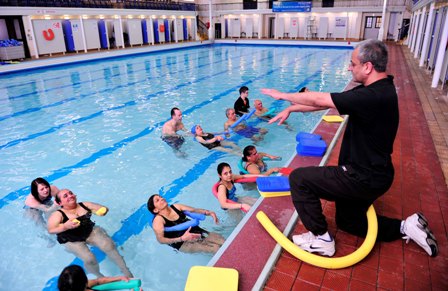
RAPS: a new register for learn to swim teaching qualifications
RAPS: a new style for swimming
When it comes to internecine conflict, the Montagues and Capulets could have learned something from the UK’s aquatic bodies but it seems peace has now broken out on the poolside. Mick Owen reports on RAPS, a new initiative for swim teaching that has brought together some of the leading players in the learn to swim market.

RAPS: a new register for learn to swim teaching qualifications
There is some very old newsreel footage of British prime minister Neville Chamberlain grasping a piece of paper and telling the world that it, the paper, represented “peace in our time”. Roger Millward, chief executive of Swimming Teachers’ Association (STA), may not have made the same claim for the Powerpoint presentation that explained the brand new Register of Aquatic Professionals (RAPS) but everyone in his audience, both within and beyond the seminar space at Leisure Industry Week, will know that this is exactly what it represents.
To say that the STA and the Amateur Swimming Association (ASA) have been at loggerheads over a number of issues over the years is an understatement but with one fell swoop SkillsActive seem to have brokered an end to the feud by the simple expedient of providing what sport psychologists would call a “super-ordinate goal”. Simply put, the benefits of working together to achieve the aims of RAPS has superseded all the reasons to work against each other and Millward was happy enough to acknowledge the difficulties of the past while emphasising the positives of the new joint approach.
One of the strengths of the new approach is that the partners are not required to deliver an homogenous commercial offer, even after a period of adjustment which will see the “20 to 30 existing qualifications for swim teaching” and the people who hold them brought to a common standard. Millward’s explanation is illuminating: “We are seeking to achieve commonality of qualification but each organisation will deliver them differently. We will have different delivery styles and even different prices but the standard will be the same.” Concerned that his audience might jump to an unhelpful conclusion, he adds: “We will all be driven by quality, not price.”
Despite RAPS still only being at a developmental stage, it is easy to see how positive a force it might be in the learn to swim market, which is one of the biggest sectors of the sport, leisure and culture industry. STA alone certify 30,000 teaching qualifications per year and when that is added to the big numbers generated by the ASA and the third, less heralded, partner in RAPS delivery, the Royal Lifesaving Society (RLSS), it is clear that selling qualifications in swimming teaching, lifeguarding and pool plant operating is big business. By “providing verification that those working in the sector are fully qualified to perform their role” RAPS will both enhance those individuals’ employability and clarify for employers the currently confused qualifications picture. In future RAPS members will be mapped at any one of four levels – entry level, operator, supervisor or manager – and be able to prove that they have passed the appropriate test and then maintained their competence by completing accredited, annual continual professional development (CPD). There is even provision that, having got past Level 4, the career aquatics professional can move seamlessly into the arms of the Chartered Institute for the Management of Sport and Physical Activity (CIMPSA).
The new register is actually two registers, one of qualifications and one of people holding them. The similarity to the Register of Exercise Professionals (REPS) is no accident and doubtless RAPS would like match their Lycra-clad colleagues’ 30,000 members but nobody is pretending that will happen any time soon. REPS took ten years to achieve their current membership and the timeline for the new project speaks of being operational in January next year with common unit qualifications ready to go in late 2013 or early 2014. It was notable that the man from SkillsActive, the organisation that effectively owns RAPS and is the force behind its inception, was keen to point out that the register is a work in progress.
Although neither innovative nor massively important beyond the confines of the aquatics world, the adoption of the REPS model to create RAPS could and should point the way for other sectors within sport, leisure and culture; coaching could perhaps be another sector that warrants such a development. Clarification of how one organisation’s qualification maps against another’s, a single register of active and current practitioners (and those words do not mean the same thing), along with the impetus for co-operation which both REPS and RAPS engender, would revolutionise sports coaching. Whether the warring factions in that industry sector can do what Roger Millward and his opposite number at the ASA have managed – the burying of their various hatchets somewhere other than in each others’ backs – is currently moot
Mick Owen is the managing editor of The Leisure Review.
The Leisure Review, October 2012
© Copyright of all material on this site is retained by The Leisure Review or the individual contributors where stated. Contact The Leisure Review for details.
Download a pdf version of this article for printing